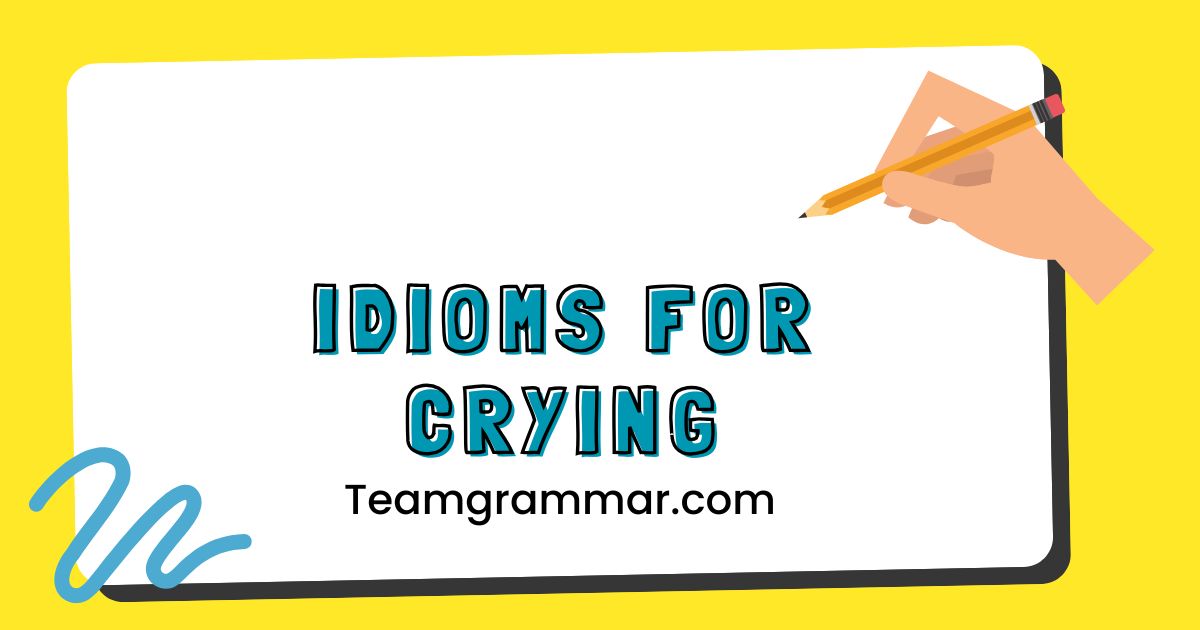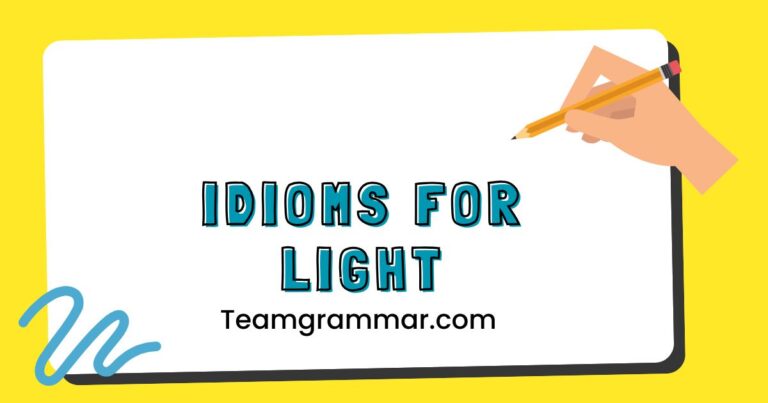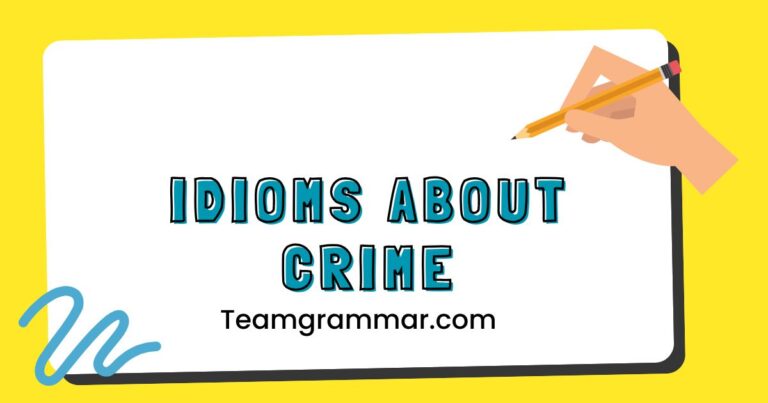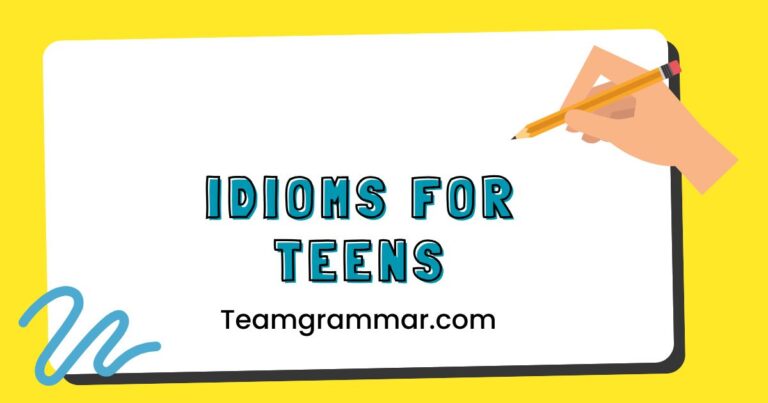45 Idioms For Crying: Mastering Figurative Language
Understanding idioms related to crying is crucial for mastering English figurative language. These expressions go beyond literal meanings, adding depth and nuance to communication.
By learning these idioms, English language learners can improve their comprehension of spoken and written English, express themselves more vividly, and avoid misunderstandings. This article provides a comprehensive guide suitable for both intermediate and advanced learners, exploring definitions, structural breakdowns, examples, usage rules, common mistakes, and practice exercises to solidify your understanding.
Table of Contents
- Introduction
- Definition of Idioms for Crying
- Structural Breakdown
- Types and Categories of Crying Idioms
- Examples of Idioms for Crying
- Usage Rules for Crying Idioms
- Common Mistakes with Crying Idioms
- Practice Exercises
- Advanced Topics
- FAQ
- Conclusion
Definition of Idioms for Crying
Idioms are expressions whose meanings cannot be understood from the literal definitions of the words they contain. They are a type of figurative language that adds color and depth to communication.
Idioms for crying specifically refer to phrases that describe the act of crying, the intensity of crying, the reason for crying, or the emotional state associated with crying. These idioms often use vivid imagery and metaphorical language to convey the experience of crying in a more expressive way than simple, literal descriptions.
In English grammar, idioms function as fixed expressions. Their grammatical structure is generally invariable, meaning the words and their order cannot be changed without altering or losing the idiom’s intended meaning.
Understanding the context in which an idiom is used is crucial for accurate interpretation. These idioms are prevalent in everyday conversation, literature, and media, making their comprehension essential for effective communication and cultural understanding.
Structural Breakdown
The structure of idioms for crying varies depending on the specific expression. Some idioms are simple phrases consisting of a verb and a preposition, while others are more complex sentences.
Many idioms use verbs like “cry,” “weep,” or “bawl” in combination with adverbs or prepositions to modify the action. For example, “cry your eyes out” uses the verb “cry” and a prepositional phrase “your eyes out” to indicate intense crying.
Other idioms may use metaphors or similes to describe crying indirectly. For instance, “shed crocodile tears” uses the metaphor of a crocodile’s insincere tears to describe someone pretending to be sad.
Understanding the structural components of an idiom – the verbs, nouns, prepositions, and their arrangement – can help learners recognize and interpret these expressions more effectively. It’s important to note that the individual words in an idiom often lose their literal meaning and contribute to a new, collective meaning.
The grammatical structure of idioms is generally fixed. This means that you cannot change the order of the words or substitute them with synonyms without changing the meaning or rendering the idiom nonsensical.
For example, you cannot say “weep your eyes out” instead of “cry your eyes out” and retain the same meaning. This fixed nature is a key characteristic of idioms and distinguishes them from other types of phrases.
Types and Categories of Crying Idioms
Idioms for crying can be categorized based on various aspects of the act of crying, such as the intensity, cause, emotional state, and duration. Categorizing these idioms helps learners to grasp the nuances of each expression and use them appropriately in different contexts.
Intensity of Crying
These idioms describe the degree or severity of crying, ranging from mild sadness to intense grief. They often use exaggerated language to convey the emotional impact.
Examples include “cry your eyes out,” “bawl your head off,” and “weep buckets.” These idioms are useful for expressing the strength of one’s emotional response.
Cause of Crying
These idioms indicate the reason or trigger for crying. They can refer to situations that cause sadness, frustration, or even joy.
Examples include “cry over spilled milk,” “cry wolf,” and “something to cry about.” Understanding these idioms helps in identifying the underlying cause of someone’s tears.
Emotional State Related to Crying
These idioms describe the emotional state or feeling associated with crying, such as sadness, grief, or regret. Examples include “shed tears of joy,” “shed bitter tears,” and “choke back tears.” These idioms provide insight into the emotional experience of the person crying.
Duration of Crying
These idioms indicate how long someone has been crying or is expected to cry. They can suggest a brief period of sadness or a prolonged period of grief.
Examples include “cry for a while,” “have a good cry,” and “cry yourself to sleep.” These idioms add a temporal dimension to the description of crying.
Examples of Idioms for Crying
This section provides a comprehensive list of idioms related to crying, categorized by their meaning and usage. Each example is accompanied by a definition and a sentence illustrating its use in context.
Understanding these examples will help you to recognize and use these idioms correctly.
Idioms Describing Intensity
The following table provides idioms that describe the intensity of crying. These idioms range from mild sadness to extreme grief.
| Idiom | Definition | Example Sentence |
|---|---|---|
| Cry your eyes out | To cry very hard for a long time. | She cried her eyes out after watching the sad movie. |
| Bawl your head off | To cry loudly and uncontrollably. | The child bawled his head off when he didn’t get the toy he wanted. |
| Weep buckets | To cry a lot; to shed many tears. | She wept buckets at her grandmother’s funeral. |
| Cry a river | To cry a great deal; to be very upset. | He cried a river when his favorite team lost the championship. |
| Sob uncontrollably | To cry with convulsive gasps. | She sobbed uncontrollably after hearing the news. |
| Tears streaming down face | Tears flow continuously from the eyes. | Tears were streaming down her face as she read the letter. |
| Break down in tears | Suddenly start crying. | She broke down in tears when they announced the winner. |
| Have a good cry | To cry freely and release emotions. | Sometimes you just need to have a good cry to feel better. |
| Burst into tears | To suddenly start crying. | She burst into tears when she saw her family. |
| Tears well up | Tears start to gather in the eyes. | Tears welled up in his eyes as he spoke about his childhood. |
| Tears prick eyes | To feel the sensation of tears forming. | Tears pricked my eyes when I saw the old photograph. |
| Eyes brimming with tears | Eyes are full and about to overflow with tears. | Her eyes were brimming with tears as she listened to the music. |
| Cry a flood of tears | To cry an excessive amount. | She cried a flood of tears when she heard the news. |
| Shed copious tears | To cry abundantly. | She shed copious tears during the touching scene. |
| Tears gush out | Tears flow rapidly and abundantly. | Tears gushed out as she recounted the story. |
| Tears cascade down cheeks | Tears flow down cheeks like a waterfall. | Tears cascaded down her cheeks as she read the letter. |
| Tears flowed freely | Tears were not held back and flowed abundantly. | Tears flowed freely as she spoke of her loss. |
| Cry one’s heart out | To cry intensely and express deep sorrow. | She cried her heart out when she heard the bad news. |
| Cry oneself blind | To cry so much that one’s vision seems impaired. | He felt like he could cry himself blind with grief. |
| Cry until there are no tears left | To cry until emotionally exhausted. | She cried until there were no tears left. |
| Cry like a baby | To cry a lot, typically loudly and openly. | He cried like a baby when his team lost. |
| Cry like a child | Similar to crying like a baby; implies innocent or vulnerable crying. | She cried like a child when she got lost in the store. |
| Cry until the cows come home | To cry for a very long time. | You can cry until the cows come home, but it won’t change anything. |
| Cry one’s eyes dry | To cry until one is no longer able to produce tears. | She cried her eyes dry after the breakup. |
Idioms Describing the Cause of Crying
The following table provides idioms that describe the cause or reason for crying.
| Idiom | Definition | Example Sentence |
|---|---|---|
| Cry over spilled milk | To be upset about something that has already happened and cannot be changed. | There’s no use crying over spilled milk; we need to focus on what to do next. |
| Cry wolf | To raise a false alarm; to call for help when it’s not needed. | If you cry wolf too often, people won’t believe you when you’re really in trouble. |
| Something to cry about | A situation that warrants sadness or grief. | Losing her job was definitely something to cry about. |
| Not worth crying over | Something that is not important enough to be upset about. | It’s not worth crying over; you can always buy a new one. |
| Make someone cry | To cause someone to feel sad and cry. | His harsh words made her cry. |
| Brought to tears | Caused to cry, often by something touching or emotional. | The story brought her to tears. |
| Cry for joy | To cry because of happiness. | She cried for joy when she heard she had been accepted into university. |
| Cry with relief | To cry because of the alleviation of stress or worry. | She cried with relief when she found her lost dog. |
| Driven to tears | Made to cry, often by extreme stress or sadness. | The constant bullying drove her to tears. |
| Cry out of frustration | To cry because of feeling helpless or annoyed. | He cried out of frustration after failing the exam. |
| Cry out of anger | To cry as a result of being angry or upset. | She cried out of anger after the argument. |
| Cry on someone’s shoulder | To seek comfort from someone when upset. | She needed someone to cry on after the breakup. |
| Cry foul | To protest or complain strongly about something considered unfair. | The team cried foul when the referee made a controversial call. |
| Cry for the moon | To ask for something impossible or unattainable. | He’s crying for the moon if he thinks he can get that job without any experience. |
| Cry blue murder | To make a loud and exaggerated complaint. | He cried blue murder when he found out he had to work late. |
| Cry for help | To seek assistance when in distress. | The stranded hiker cried for help. |
| Cry for attention | To behave in a way that attracts notice, often through distress. | He’s just crying for attention; ignore him. |
| Cry over onions | To cry when cutting onions. | She always cries over onions when she cooks. |
| Cry all the way to the bank | To profit greatly from something, despite negative circumstances. | He may have faced criticism, but he’s crying all the way to the bank with his successful business. |
| Cry before one is hurt | To anticipate problems or misfortune excessively. | There’s no need to cry before you are hurt; wait and see what happens. |
Idioms Describing Emotional State
The following table provides idioms that describe the emotional state associated with crying.
| Idiom | Definition | Example Sentence |
|---|---|---|
| Shed tears of joy | To cry because of happiness. | She shed tears of joy when she saw her son graduate. |
| Shed bitter tears | To cry because of sadness or regret. | He shed bitter tears as he apologized for his mistake. |
| Choke back tears | To try to suppress or hold back tears. | She choked back tears as she delivered the eulogy. |
| Fighting back tears | Making an effort not to cry. | He was fighting back tears as he watched his daughter leave for college. |
| Tears of remorse | Crying because of regret or guilt. | He shed tears of remorse for his actions. |
| Tears of sympathy | Crying out of compassion for someone else’s suffering. | She shed tears of sympathy for the victims of the disaster. |
| Tears of frustration | Crying because of feeling helpless or annoyed. | He shed tears of frustration after failing the exam. |
| Tears of anger | Crying as a result of being angry or upset. | She shed tears of anger after the argument. |
| Tears of despair | Crying because of hopelessness. | He shed tears of despair when he realized his situation was hopeless. |
| Tears of grief | Crying because of sorrow or loss. | She shed tears of grief over the loss of her friend. |
| Tears of relief | Crying because of the alleviation of stress or worry. | She shed tears of relief when she found her lost dog. |
| Tears of gratitude | Crying because of thankfulness. | She shed tears of gratitude for all the support she received. |
| Tears of helplessness | Crying because of a feeling of being powerless. | She shed tears of helplessness as she watched the situation unfold. |
| Tears of vulnerability | Crying because of feeling exposed or defenseless. | She shed tears of vulnerability as she shared her story. |
| Tears of nostalgia | Crying because of longing for the past. | She shed tears of nostalgia as she looked through old photographs. |
| Tears of regret | Crying because of feeling sorry for something one has done or not done. | He shed tears of regret for the opportunities he had missed. |
| Tears of shame | Crying because of feeling embarrassed or disgraced. | She shed tears of shame after her public humiliation. |
| Tears of pride | Crying because of feeling pleased and satisfied with oneself or someone else. | She shed tears of pride as she watched her daughter receive the award. |
| Tears of awe | Crying because of feeling amazed or impressed. | She shed tears of awe as she witnessed the breathtaking view. |
Idioms Describing Duration
The following table provides idioms that describe the duration of crying.
| Idiom | Definition | Example Sentence |
|---|---|---|
| Cry for a while | To cry for a short period of time. | She cried for a while after the argument. |
| Have a good cry | To cry freely and release emotions. | Sometimes you just need to have a good cry to feel better. |
| Cry yourself to sleep | To cry until one falls asleep. | She cried herself to sleep after the breakup. |
| Cry all night | To cry throughout the entire night. | He cried all night after the bad news. |
| Cry for days | To cry for an extended period of time. | She cried for days after her pet died. |
| Cry on and off | To cry intermittently over a period of time. | She cried on and off throughout the day. |
Other Crying Idioms
Here are some other idioms related to crying that do not fit neatly into the previous categories.
| Idiom | Definition | Example Sentence |
|---|---|---|
| Shed crocodile tears | To pretend to be sad; to show insincere sorrow. | He was shedding crocodile tears at the funeral, but everyone knew he didn’t care. |
| Keep a stiff upper lip | To remain brave and not show emotions, especially sadness. | She kept a stiff upper lip even though she was devastated. |
| Dry your eyes | To stop crying; to cheer up. | Dry your eyes; things will get better. |
| No use crying over it | It’s pointless to be upset about something that cannot be changed. | There’s no use crying over it; let’s move on. |
Usage Rules for Crying Idioms
Using idioms correctly requires understanding their specific meanings and contexts. Here are some key usage rules to keep in mind:
- Context is crucial: Pay attention to the situation and the speaker’s intention. Idioms can have different connotations depending on the context.
- Figurative vs. Literal: Remember that idioms are figurative expressions. Avoid interpreting them literally.
- Fixed Expressions: Do not change the words or word order of an idiom. Idioms are fixed expressions, and altering them can change their meaning or make them nonsensical.
- Cultural Awareness: Be aware that some idioms may be culture-specific and may not be understood by everyone.
- Appropriateness: Consider the formality of the situation. Some idioms are more appropriate for informal settings than formal ones.
- Audience: Be mindful of your audience. Avoid using idioms that may be unfamiliar or confusing to them.
Common Mistakes with Crying Idioms
Learners often make mistakes when using idioms for crying. Here are some common errors and how to avoid them:
| Incorrect | Correct | Explanation |
|---|---|---|
| Weep your eyes out. | Cry your eyes out. | “Cry” is the correct verb to use in this idiom. |
| Cry on the milk that has been spilled. | Cry over spilled milk. | The preposition “over” is the correct one in this idiom. |
| Shed happy tears. | Shed tears of joy. | The correct idiom uses the preposition “of.” |
| I am keeping a hard upper lip. | I am keeping a stiff upper lip. | “Stiff” is the correct adjective to use in this idiom. |
| Don’t cry about it. | Don’t cry over it. | “Over” is the appropriate preposition in this context. |
Practice Exercises
Test your understanding of idioms for crying with the following exercises.
Exercise 1: Fill in the Blanks
Complete the following sentences with the appropriate idiom from the list below.
Idiom List: cry your eyes out, cry wolf, shed tears of joy, cry over spilled milk, choke back tears
| Question | Answer |
|---|---|
| 1. There’s no use to ________; we can’t change what happened. | cry over spilled milk |
| 2. She ________ when she heard she got the job. | shed tears of joy |
| 3. He ________ when he watched the sad movie. | cried his eyes out |
| 4. She had to ________ during the emotional speech. | choke back tears |
| 5. If you ________ too often, no one will believe you. | cry wolf |
| 6. She _______ when she received the surprise birthday gift. | shed tears of joy |
| 7. After failing the crucial exam, he felt like he could _______. | cry his eyes out |
| 8. It’s better to move on rather than _______ about what you can’t control. | cry over spilled milk |
| 9. The soldier tried to _______ as he spoke of his fallen comrades. | choke back tears |
| 10. The boy who _______ was eventually ignored when he was in real danger. | cried wolf |
Exercise 2: Matching
Match the idiom with its correct definition.
| Idiom | Definition |
|---|---|
| 1. Shed crocodile tears | a. To cry because of happiness |
| 2. Cry for the moon | b. To pretend to be sad |
| 3. Shed tears of joy | c. To ask for something impossible |
Answers:
- 1 – b
- 2 – c
- 3 – a
| Question | Answer |
|---|---|
| 1. Cry your heart out | a. To pretend to be sad |
| 2. Shed bitter tears | b. To cry intensely and express deep sorrow |
| 3. Shed crocodile tears | c. To cry because of sadness or regret |
| 4. No use crying over it | d. It’s pointless to be upset about something that cannot be changed |
Answers:
- 1 – b
- 2 – c
- 3 – a
- 4 – d
Exercise 3: Sentence Creation
Create a sentence using each of the following idioms.
| Idiom | Example Sentence |
|---|---|
| Burst into tears | She burst into tears when she heard the good news. |
| Cry on someone’s shoulder | He needed someone to cry on after the breakup. |
| Dry your eyes | Dry your eyes; everything will be alright. |
| Cry a river | She cried a river when her favorite character died in the book. |
| Have a good cry | Sometimes, you just need to have a good cry to release all the pent-up emotions. |
| Cry all the way to the bank | Even though the project was difficult, they cried all the way to the bank after its success. |
| Cry before one is hurt | There’s no need to cry before one is hurt; let’s wait to see what happens before worrying. |
Advanced Topics
For advanced learners, exploring the nuances of idioms related to crying can involve delving into their etymology, cultural context, and literary usage. Understanding the historical origins of these expressions can provide deeper insights into their meanings and connotations.
For example, the idiom “shed crocodile tears” comes from the ancient belief that crocodiles weep while devouring their prey, suggesting insincere sorrow.
Analyzing how idioms are used in literature and media can also enhance comprehension. Authors and filmmakers often employ idioms to add depth and emotional resonance to their narratives.
Recognizing these idioms in context can improve your ability to interpret complex texts and appreciate the artistry of language. Furthermore, comparing idioms across different languages can reveal cultural differences in how emotions are expressed and perceived.
Studying the psychological impact of crying and how it is represented in language can provide a more nuanced understanding of the emotional and cultural significance of these idioms. Exploring the relationship between language and emotion can enhance your ability to communicate effectively and empathetically.
FAQ
- What is an idiom?
An idiom is a phrase or expression whose meaning cannot be understood from the literal meanings of its individual words. It is a type of figurative language that adds color and depth to communication.
- Why is it important to learn idioms?
Learning idioms is important because they are commonly used in everyday conversation, literature, and media. Understanding idioms improves comprehension, enhances communication skills, and provides cultural insights.
- How can I learn idioms effectively?
You can learn idioms effectively by reading widely, listening to native speakers, using flashcards, and practicing using idioms in your own speech and writing. Pay attention to the context in which idioms are used and try to understand their figurative meanings.
- Can I change the words in an idiom?
No, you cannot change the words in an idiom. Idioms are fixed expressions, and altering them can change their meaning or make them nonsensical.
- Are idioms the same in all languages?
No, idioms are not the same in all languages. Idioms are often culture-specific and may not have direct equivalents in other languages.
- What does “cry your eyes out” mean?
“Cry your eyes out” means to cry very hard for a long time. It suggests intense grief or sadness.
- What does “shed crocodile tears” mean?
“Shed crocodile tears” means to pretend to be sad or to show insincere sorrow. It implies that the person is not genuinely upset.
- When is it appropriate to use idioms?
It is appropriate to use idioms in informal settings, such as conversations with friends and family. In formal settings, it is generally best to use more direct and literal language.
- How can I avoid making mistakes with idioms?
You can avoid making mistakes with idioms by studying their meanings and usages carefully, practicing using them in context, and asking native speakers for feedback.
- What is the difference between an idiom and a metaphor?
An idiom is a fixed expression whose meaning is different from the literal meanings of its individual words, while a metaphor is a figure of speech that compares two unlike things to suggest a similarity.
- Are there any idioms that have multiple meanings?
Yes, some idioms can have multiple meanings depending on the context. It is important to pay attention to the situation and the speaker’s intention to understand the intended meaning.
- How do I know if a phrase is an idiom or just a literal expression?
You can determine if a phrase is an idiom by considering whether its meaning can be understood from the literal meanings of its individual words. If the phrase has a figurative meaning that is different from its literal meaning, it is likely an idiom.
Conclusion
Mastering idioms related to crying is essential for enhancing your English language skills and cultural understanding. By understanding the definitions, structural breakdowns, types, examples, and usage rules of these expressions, you can communicate more effectively and appreciate the nuances of English figurative language.
Remember to pay attention to context, avoid literal interpretations, and practice using idioms in your own speech and writing.
Continue to expand your vocabulary by exploring other types of idioms and figurative expressions. The more you immerse yourself in the language, the more natural and confident you will become in your communication.
Embrace the challenges of learning English, and enjoy the journey of linguistic discovery.







